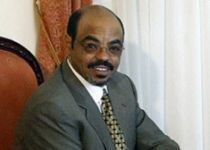Ex-guerrilla warrior Meles seeks third term as Ethiopian PM
ADDIS ABABA, May 14 (AFP) — Nearly 15 years after leading the fight to oust a Soviet-backed dictatorship, ex-guerrilla fighter Meles Zenawi is seeking a third term as prime minister of impoverished Ethiopia in Sunday elections.
 The one-time communist now west-leaning center leftist, Meles is counting on support from a largely poverty stricken electorate to return his Ethiopian People’s Revolutionary Democratic Front (EPRDF) to power.
The one-time communist now west-leaning center leftist, Meles is counting on support from a largely poverty stricken electorate to return his Ethiopian People’s Revolutionary Democratic Front (EPRDF) to power.
Born on May 8, 1955 in Adwa in Tigria province bordering what is now Eritrea, Meles joined the ranks of the what became the Tigrian People’s Liberation Front (TPLF) during the revolutionary transformation in Ethiopia that led to the ouster of Ethiopian Emperor Haile Selassie in 1974.
In 1978 he dropped out of medical school as the TPLF joined the struggle against Selassie’s successor as leader, Mengistu Haile Mariam who headed the communist authoritarian “Derg” (Committee) regime in the vast Horn of Africa nation for 17 years.
Elected chief of the TPLF’s political department before rising to the top seat, Meles helped form the EPRDF, a broader alliance that incorporates regional political parties, and returned from a trip to Washington in 1990 having eschewed Marxism.
He then forged an understanding with the Eritrean People’s Liberation Front (EPLF) headed by Issaias Afeworki, now president of Eritrea and a bitter rival, to fight the Derg and the two combined forces to push out the waning Mengistu regime in 1991.
As a 36-year-old rebel leader he became president of Ethiopia’s transitional government and after helping to draft a new constitution was elected prime minister of the country four years later.
Meles began opening Ethiopia to the outside world, embracing a free market economy to fight chronic poverty among the country’s 70 million people.
Under his leadership, Ethiopia’s economy has made modest progress but is still dependent on foreign assistance for some 40 percent of its budget.
And despite Meles’ political style that has earned Ethiopia new bilateral development partners, some have dismissed him as lacking consistency.
His policies on agriculture and property, primary concerns of nearly all of Ethiopia’s 70 million inhabitants, have raised eyebrows as they have neither introduced land ownership or ended the country’s dependence on food aid.
Under his leadership, Ethiopia has also come under scathing criticism for its human rights record, charges that Meles denies.
His rule hinges on a delicate balance of governing a huge territory populated by 87 different ethnic groups that is split into nine federal
states based largely on ethnicity.
